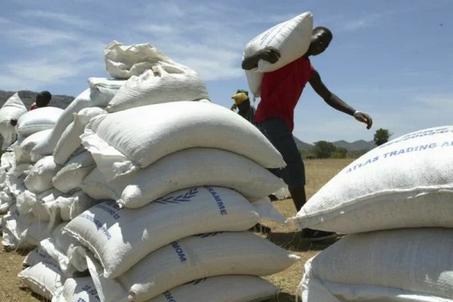News / National
'Zimbabwe is committed to impartial food distribution'
19 Jun 2024 at 11:23hrs |
0 Views

Despite the El Nino-induced drought, the Zimbabwean government has been working tirelessly to ensure food security for all citizens.
Recently, the United Nations signed a $429 million drought flash appeal with the government to assist over 3 million food-insecure individuals. The World Food Programme (WFP) and other development partners are also collaborating with the government to provide humanitarian aid.
However, the Zimbabwe Peace Project (ZPP), a civic society organization, has made unfounded claims of partisan food distribution in its Monthly Monitoring Report for May 2024. The ZPP has a history of spreading false information, which has led to questions about its credibility.
In reality, food aid distribution in Zimbabwe is a non-partisan effort, with clear government structures in place to ensure fairness and transparency.
The Food Deficit Mitigation Programme, implemented through the Ministry of Public Service, Labour and Social Welfare, provides food assistance to rural areas based on the Zimbabwe Vulnerability Assessment Committee (ZimVac) results.
The targeting of beneficiaries and distribution of grain are undertaken through District Drought Relief Committees, which comprise government entities, traditional leadership, and development partners.
Traditional leaders play a crucial oversight role in ensuring grain reaches intended recipients.
In May alone, 3,246.68 tonnes of grain were distributed to food-insecure households. The government is also investing in long-term solutions, such as the Presidential Community Fisheries Scheme, which aims to establish 10,000 village ponds to promote food security.
Under President Mnangagwa's leadership, the Second Republic is committed to ensuring no citizen goes hungry due to the drought. The government's efforts demonstrate its dedication to building resilience in national food security.
Recently, the United Nations signed a $429 million drought flash appeal with the government to assist over 3 million food-insecure individuals. The World Food Programme (WFP) and other development partners are also collaborating with the government to provide humanitarian aid.
However, the Zimbabwe Peace Project (ZPP), a civic society organization, has made unfounded claims of partisan food distribution in its Monthly Monitoring Report for May 2024. The ZPP has a history of spreading false information, which has led to questions about its credibility.
In reality, food aid distribution in Zimbabwe is a non-partisan effort, with clear government structures in place to ensure fairness and transparency.
The Food Deficit Mitigation Programme, implemented through the Ministry of Public Service, Labour and Social Welfare, provides food assistance to rural areas based on the Zimbabwe Vulnerability Assessment Committee (ZimVac) results.
The targeting of beneficiaries and distribution of grain are undertaken through District Drought Relief Committees, which comprise government entities, traditional leadership, and development partners.
Traditional leaders play a crucial oversight role in ensuring grain reaches intended recipients.
In May alone, 3,246.68 tonnes of grain were distributed to food-insecure households. The government is also investing in long-term solutions, such as the Presidential Community Fisheries Scheme, which aims to establish 10,000 village ponds to promote food security.
Under President Mnangagwa's leadership, the Second Republic is committed to ensuring no citizen goes hungry due to the drought. The government's efforts demonstrate its dedication to building resilience in national food security.
Source - Byo24News
Join the discussion
Loading comments…
































